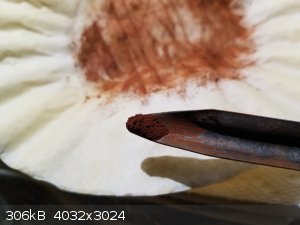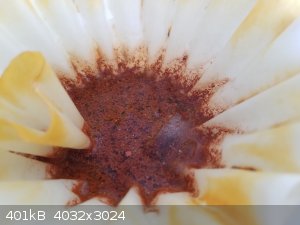Rhodanide
Hazard to Others
  
Posts: 348
Registered: 23-7-2015
Location: The 80s
Member Is Offline
Mood: That retro aesthetic
|
|
Tetraiodoethylenediamine!
It's been a while since I last posted, so here's something interesting!
These past few months, I've been tinkering with Halogenated derivatives of Ethylenediamine. The first success was Tetrachloroethylenediamine, via rxn
of an aqueous solution of en + AcOH with 6% NaClO solution. The Cl4en (short for Tetrachloroethylenediamine) was relatively stable until around the
two week mark, when it unexpectedly began to form a thick precipitate of yellow solid which I assumed to be a decomposition product. I then went on to
make Br4en, the Bromine derivative by adding KBr to the acidic en solution before NaClO. I don't know if this worked exactly, but I did have ~3-4 mLs
of a dark red liquid which exploded with a thwump on strong, sudden heating. Confident with my successes, I had a go at the Tetraiodo
derivative.
Boy, what a time that was. My method was simple: I'd dissolve en, AcOH & KI in distilled water, then add that in one go to some Bleach with
stirring, keeping an eye on the mild exotherm. Simple, it had worked flawlessly for the Cl and Br compounds. I began by adding the acidic en & KI
solution to the NaClO, and was pleasantly surprised to see a thick, vibrant orange precipitate settle to the bottom of the beaker. What I wasn't so
pleasantly surprised about was when said precipitate suddenly rose to the top of the beaker, and began to bubble. I thought this was likely normal
until the orange solid began to smoke at an increasing rate. Soon, my entire lab area was filled with whatever decomposition products or voodoo black
magic that stuff gives off when it gets angry in the form of a dense, white smoke. I decided to re-attempt the reaction in order to isolate the orange
solid. My success came when I added the two solutions with lots of ice cubes. Initially, it seemed that I2 was being produced as there was
a black solid which looked a lot like Iodine. Further slow addition of the en & KI solution to the Bleach + Ice yielded a bright orange
precipitate which happily sat in suspension. This was then filtered and dried. Initial observations of the compound: Likely
N,N,N,N-tetraiodoethylenediamine, a rust colored amorphous powder which decomposes violently under a flame with a hissing noise and emission of
gaseous I2. it's likely light-sensitive, as it darkens over time in the open whereas a sample in the dark keeps its rust color. Likely no
exciting energetic properties besides going "poof" under a flame (haven't tried detonation), but interesting nonetheless considering it's an explosive
Iodoamine.
Pictures below, both of the product!
 
|
|
|
DraconicAcid
International Hazard
    
Posts: 4355
Registered: 1-2-2013
Location: The tiniest college campus ever....
Member Is Offline
Mood: Semi-victorious.
|
|
That's certainly a creative thing to try.
Please remember: "Filtrate" is not a verb.
Write up your lab reports the way your instructor wants them, not the way your ex-instructor wants them.
|
|
|
MineMan
International Hazard
    
Posts: 1012
Registered: 29-3-2015
Member Is Offline
Mood: No Mood
|
|
So Bromine would be the oxidizer? I know periodates are being looked at. Specifically potassium, the problem however is the positive heat of
formation upon decomposition.
|
|
|
|